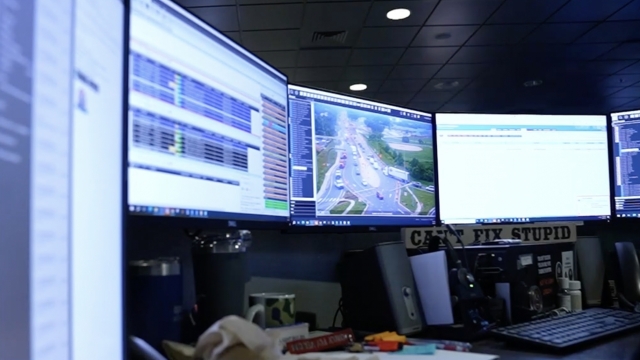From traffic signals to traffic flow, 24 hours a day, seven days a week, information on what's happening on all the roads in Delaware streams into the state's Transportation Management Center.
"Signals have been my business over 50 years. Everybody takes them for granted," said Gene Donaldson, the TMC's operations manager. "I've been implementing signal systems when they used to be pre-time, fixed-time dial spinning."
A lot has changed since then and now the state of Delaware is one of a handful of places where artificial intelligence – or A.I. — is about to take on a greater role in how drivers get around.
"We are adding A.I. to the operation of all the traffic signals, which is over 1,300 in the state," Donaldson said. "And we're working on machine vision as part of that."
That complex system involves traffic lights, cameras and sensors, along with data coming in from weather stations and emergency responder channels, which all coalesce within A.I. The artificial intelligence then makes traffic-management decisions based on that information.
"Our testing shows it's about 98% reliable in identifying where there's a problem," Donaldson said. "We only have so many technicians and they are monitoring and doing other critical work. A.I. is going to be able to watch far more than a human being can watch."
SEE MORE: San Francisco approves robotaxi expansion despite safety concerns
Part of this project, paid for with state and federal infrastructure dollars, focuses on dealing with the potential impact of flooding in Delaware. The state has the lowest mean elevation in the country. Every year, more than 20 million visitors flock there, with many heading to the beaches in the summer.
"We're subject to flooding more and more frequently," Donaldson said.
Not all visitors are familiar with the roads and which ones are prone to flooding. Traffic managers say A.I. can serve as a predictor and send out messages to drivers via roadway monitors and through smartphones about which roads to avoid to help manage potential evacuations.
"This is one of the more advanced systems and over the next year it will be one of the more advanced systems in the United States," Donaldson said.
It could become even more advanced.
"In any computing system, the more information a system has, the better decisions it can make," said Stan Caldwell, executive director of the Traffic 21 Institute at Carnegie Mellon University.
Last December, Caldwell spoke about how self-driving vehicles will be communicating with these so-called 'smart roads' in the near future. That testing is ongoing in a number of states, including Virginia and Ohio.
"There will be positive impacts and there will be negative impacts," he said. "And so being able to get that real-world data in a real-world environment is very important for the researchers to be able to help guide the policymakers in how to manage this in the future."
Back in Delaware, traffic managers say they know there's always a chance for a cyberattack on such a system. They wouldn't go into details, but insist the system is protected.
"We have a dedicated effort to make sure our data is secure," Donaldson said.
Traffic managers said A.I. will eventually be able to use the network of traffic cameras and sensors to predict if a vehicle is about to run a red light — and then hold the light green, in order to prevent a collision.
"The more you advance this technology, it's going to reduce serious kinds of accidents," Donaldson said.
It is something they believe could potentially save time, money and lives.
Trending stories at Scrippsnews.com





